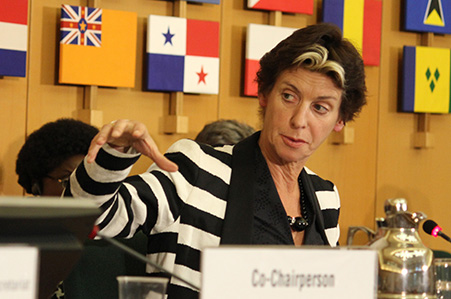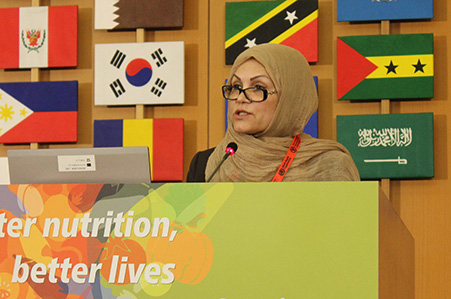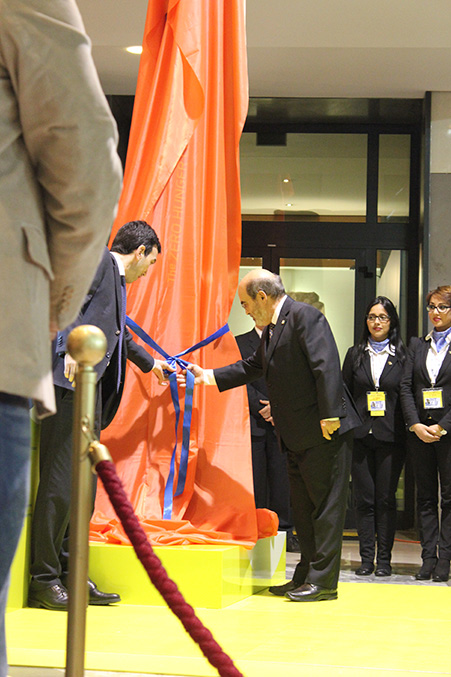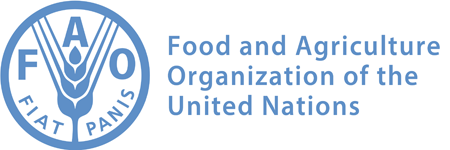|
|
 |
 |
 |
 |
On Friday, 21 November, ICN2 concluded the general debate, and then heard presentations on the pre-session events. Reporting on the 18 November Parliamentary Meeting, Pier Ferdinando Casini, Honorary President of the Inter-Parliamentary Union (IPU) and President of the Commission for Foreign Affairs of the Senate, Italy, highlighted the urgent need for Parliaments to advocate for more effective responses to address malnutrition, while ensuring that public policies are safeguarded from real or perceived conflict of interests.
Three civil society representatives presented the conclusions of the 17-18 November Civil Society Event. Josephine Atangana, Regional Platform of Central African Farmers Organization, called it “unacceptable” that in a world of plenty so many go to bed hungry, and deploring that ICN1 “sunk without a trace,” expressed hope that ICN2 would not meet the same fate. Munkhbolor Gungaa, World Alliance of Mobile Indigenous People, called for, inter alia: policy coherence between the Committee on World Food Security (CFS) Strategic Framework and ICN2, noting that the UN CFS is the most inclusive government-led platform to address nutrition; and ensuring that food and nutrition security are fully integrated into the post-2015 development agenda. Flavio Valente Secretary-General, FIAN International, said that trade and investment agreements must comply with the right to food and nutrition, and declared a worldwide People’s Decade of Action on Nutrition.
Three private sector representatives then presented on the conclusions of the 18 November Private Sector Event. David Crean, Mars Incorporated and speaking for the Private Sector Mechanism, focused on food safety as one of the most significant and pervasive problems in sustainable development efforts, and said food security cannot be achieved without it. Marie Konate, Protein-Kissée-La on behalf of the SUN Business Network, said women are critical to nutrition, as well as to the private sector’s contribution to nutrition. Nico Van Belzen, International Dairy Federation on behalf of the Livestock Sector, discussed opportunities for public private partnerships (PPPs), including enabling environments, for example improving information systems and providing information on nutrient content.
Co-Chairs’ summaries of the three roundtables were then presented. Presenting on the roundtable on nutrition in the post-2015 development agenda, Co-Chair Anne Peniston, US Agency for International Development (USAID), noted the call for UN agencies and others to revisit the proposed SDGs and indicators, consider more ambitious targets, and develop more robust systems to measure progress toward achieving nutrition goals at local, national and global levels.
Regarding the roundtable on improving policy coherence for nutrition, Co-Chair Igor Radziewicz-Winnicki, Ministry of Health, Poland, said policy coherence for nutrition is a challenge, there is no “one size fits all” approach, and policies should reflect specific national settings and cultural environment.
Regarding the roundtable on governance and accountability for nutrition, Co-Chair Hans Brattskar, Deputy Minister for Foreign Affairs, Norway, said that the signs of malnutrition are often invisible, malnutrition is often poorly measured and reported, and nutrition has become everyone’s business and no one’s responsibility, with lack of clarity regarding who is accountable for nutrition in existing governance structures.
In conclusion, FAO Director-General José Graziano da Silva emphasized the need for adequate financing to put the framework for action into practice. He discussed next steps, including a Decade of Nutrition and the Expo Milano 2015 with support from the UN system.
ICN2 closed at approximately 2:15 pm
The IISD RS summary report of ICN2 will be available on Monday, 24 November 2014.
Visit full ICN2 coverage for Friday, 21 November 2014 |
|
 |
 |
 |
 |
 |
 |
 |
 |
On Thursday, 20 November 2014, ICN2 continued with the general debate, which convened throughout the day. Roundtables convened on: policy coherence for nutrition-sensitive agriculture; nutrition in all sectors; nutrition governance; and nutrition accountability. A number of side events were also held, including on: Expo Milano 2015; and the Global Nutrition Report and Global Hunger Index.
In a special statement to ICN2, His Holiness Pope Francis said malnutrition and hunger are hindered by market priorities, the primacy of profits and financial speculation. He called for dignity not charity, and, noting the paradox of food abundance and continuing hunger, called for a more just distribution of the world’s food.
Queen Letizia of Spain said multinational corporations must work with international agencies in promoting public health, calling for a “marriage” between commercial and economic interests and political interests. She underscored that no country has managed to reverse the obesity epidemic.
Nadine Heredia, First Lady of Peru and Special Ambassador to the FAO, emphasized focusing on: farming families; genetic diversity of seeds; retention of traditional knowledge; and revision of trade policies.
Visit full ICN2 coverage for Thursday, 20 November 2014 |
|
 |
 |
 |
 |
 |
 |
 |
 |
 |
| Gerda Verburg, Permanent Representative of the Netherlands to FAO and Chair of the Committee on World Food Security |
|
 |
 |
 |
 |
|
 |
 |
 |
 |
 |
| Zahra Abhollahi, Ministry of Health and Medical Education, Iran |
|
 |
 |
 |
 |
|
 |
 |
 |
 |
 |
| Inauguration of the UN Spoon Installation for Expo Milano 2015: Maurizio Martina, Italian Minister of Agricultural, Food and Forestry Policies, and José Graziano da Silva, Director-General of the FAO |
|
 |
 |
 |
 |
|
|
 |
 |
 |
 |
ICN2 opened in Rome, Italy, on Wednesday morning, 19 November, with statements from Paolo Gentiloni, Italian Minister of Foreign Affairs and International Cooperation, who said that those suffering from hunger had decreased from one billion in 1992 to just over 805 million today. Via video message, UN Secretary-General Ban Ki-moon provided assurances that the UN system was ready to support the ICN2 outcomes. He said that since the Zero Hunger Challenge was announced, regions around the world have committed to eliminate hunger by 2025.
Margaret Chan, Director-General, WHO, said environmental policy must be an integral part of the ICN2 discussions, warned that obesity problems would significantly increase health care costs, and announced that World Health Day 2015 would focus on food safety.
José Graziano da Silva, Director-General, FAO, said that enough food existing for everyone to eat adequately does not necessarily translate into healthy nutrition, and hoped targets would be announced at ICN2 that go beyond what has already been agreed.
Ignazio Marino, Mayor of Rome, emphasized the importance of family farming and the role of small family farms, which support sustainable and local agriculture, biodiversity and reducing hunger.
Italian Foreign Minister Paolo Gentiloni was elected by acclamation to serve as ICN2 Chair.
Delegates then adopted the Rome Declaration on Nutrition and the Framework for Action on Nutrition.
UN Messenger of Peace Princess Haya Bint Al Hussein, United Arab Emirates, said that we should spend as much on nutrition as we do on weapons.
In a special address, Melinda Gates, Co-Chair, Bill and Melinda Gates Foundation, said it was vital to build a food system to ensure year round access to safe, diverse and affordable diets for everyone, and that breastfeeding babies immediately and exclusively would save thousands of lives.
In the afternoon, roundtable sessions were on nutrition in the post-2015 development agenda, and on coherence between economic policies and healthy changes in diets.
Visit full ICN2 coverage for Wednesday, 19 November 2014 |
|
 |
 |
 |
 |
Funding for coverage of this conference has been provided by FAO
|

|
 |
 |
 |
 |
Daily Web Coverage
(Click on the following links to see our daily webpages)
|
|
|
|
|
 |
 |
 |
 |
 |
 |
 |
 |
Conference Resources
 ICN2 Website ICN2 Website
 ICN2 Provisional Agenda ICN2 Provisional Agenda
 ICN2 Provisional Timetable ICN2 Provisional Timetable
 Roundtable 1 Concept Note: Nutrition in the Post-2015 Development Agenda Roundtable 1 Concept Note: Nutrition in the Post-2015 Development Agenda
 Roundtable 2 Concept Note: Improving Policy Coherence for Nutrition Roundtable 2 Concept Note: Improving Policy Coherence for Nutrition
 Roundtable 3 Concept Note: Governance and Accountability for Nutrition Roundtable 3 Concept Note: Governance and Accountability for Nutrition
 Co-Chairs Cover Note on the Conference Outcome Documents Co-Chairs Cover Note on the Conference Outcome Documents
 Conference Outcome Document: Rome Declaration on Nutrition Conference Outcome Document: Rome Declaration on Nutrition
 Conference Outcome Document: Framework for Action Conference Outcome Document: Framework for Action
 Round Tables Programme Round Tables Programme
 Side Events Schedule Side Events Schedule
 Parliamentarian’s Event, 18 November 1014 Parliamentarian’s Event, 18 November 1014
 Private Sector Event, 18 November 2014 Private Sector Event, 18 November 2014
 Civil Society Event, 17-18 November 2014 Civil Society Event, 17-18 November 2014
IISD RS resources
 IISD RS summary and analysis of the Thirteenth session of the UN General Assembly’s (UNGA) Open Working Group (OWG) on Sustainable Development Goals (SDGs), 14-18 July 2014, UN Headquarters, New York, United States of America (English: HTML - PDF) (French: HTML - PDF) IISD RS summary and analysis of the Thirteenth session of the UN General Assembly’s (UNGA) Open Working Group (OWG) on Sustainable Development Goals (SDGs), 14-18 July 2014, UN Headquarters, New York, United States of America (English: HTML - PDF) (French: HTML - PDF)
 IISD RS summary and analysis of OWG-12, 16-20 June 2014, UN Headquarters, New York, United States of America (English: HTML - PDF) (French: HTML - PDF) IISD RS summary and analysis of OWG-12, 16-20 June 2014, UN Headquarters, New York, United States of America (English: HTML - PDF) (French: HTML - PDF)
 IISD RS summary and analysis of OWG-11, 5-9 May 2014, UN Headquarters, New York, United States of America (English: HTML - PDF) (French: HTML - PDF) IISD RS summary and analysis of OWG-11, 5-9 May 2014, UN Headquarters, New York, United States of America (English: HTML - PDF) (French: HTML - PDF)
 IISD RS summary and analysis of OWG-10, 31 March - 4 April 2014, UN Headquarters, New York, United States of America (English: HTML - PDF) (French: HTML - PDF) IISD RS summary and analysis of OWG-10, 31 March - 4 April 2014, UN Headquarters, New York, United States of America (English: HTML - PDF) (French: HTML - PDF)
 IISD RS summary and analysis of OWG-9, 3-5 March 2014, UN Headquarters, New York, United States of America (English: HTML - PDF) (French: HTML - PDF) IISD RS summary and analysis of OWG-9, 3-5 March 2014, UN Headquarters, New York, United States of America (English: HTML - PDF) (French: HTML - PDF)
 IISD RS coverage from OWG-8, 3-7 February 2014, UN Headquarters, New York, United States of America IISD RS coverage from OWG-8, 3-7 February 2014, UN Headquarters, New York, United States of America
 SDG - A Mailing List for News on Sustainable Development Policy SDG - A Mailing List for News on Sustainable Development Policy
 Sustainable Development Policy & Practice - A Knowledgebase of International Activities following up on Rio+20 and Contributing to the Post-2015 Development Agenda Sustainable Development Policy & Practice - A Knowledgebase of International Activities following up on Rio+20 and Contributing to the Post-2015 Development Agenda
 Linkages Update - Bi-Weekly International Environment and Sustainable Development News Linkages Update - Bi-Weekly International Environment and Sustainable Development News
|
|
 |
 |
 |
 |
 |
|
|
|
|